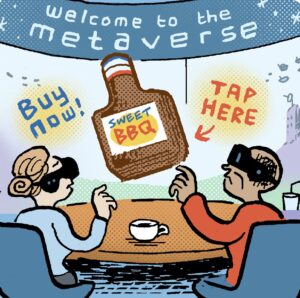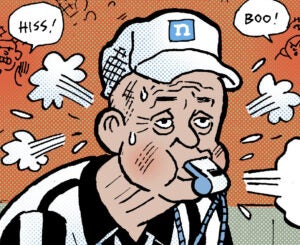The idea for a radio network specifically geared toward the Black community had been floating around at iHeartMedia for several years.
2020 made its need apparent.
When the pandemic took hold early last year, communities of color were disproportionately impacted by COVID-19 in terms of infection, hospitalization and mortality rates. Black-owned businesses were hit especially hard.
Then the death of George Floyd in May 2020 brought home that “we just couldn’t wait any longer,” according to Tony Coles, a longtime iHeartMedia executive and president of the Black Information Network (BIN).
IHeartMedia launched BIN in June with the goal of creating a national, 24/7, audio-based news service dedicated to providing objective, accurate and trusted coverage in a Black voice for a Black audience.
Since last spring, BIN has expanded into 31 markets across the country, including both iHeartRadio-owned stations and numerous stations not owned by iHeart. BIN content also streams online and through the iHeartRadio app.
BIN is funded by long-term brand partnerships, including Lowe’s, Verizon, 23andMe, GEICO, McDonald’s, CVS Health, Bank of America and Sony.
AdExchanger spoke with Coles and Gayle Troberman, CMO of iHeartMedia.
AdExchanger: What is Black Information Network’s origin story?
TONY COLES: We started getting serious in 2019. We did prelaunch research, gathered data and confirmed that there was a big need for a trusted voice in an era of “fake news.” There is a lot of mistrust of news and information in general, but we found that in the Black community, the level of mistrust is even higher.
There are a lot of stories that either weren’t getting told or had a political spin or agenda behind them. To tell stories well, we realized that we needed to build a network from top to bottom, from reporters, producers and anchors, to management and leadership, all coming from the Black community.
Just as importantly, this needed to come from all aspects of the Black community – not just monolithic groups. We want to make sure that our network is reflective not only of the various voices in the Black community, but also different political perspectives.
Why is audio the right medium for BIN?
COLES: It’s intimate and brings a feeling of companionship. Historically, there have been three places where people from the Black community get information: the barbershop, church and on the radio. Radio storytelling has long held a special place in the Black community, and BIN is a continuation of that tradition.
What is unique about BIN’s approach to monetization?
GAYLE TROBERMAN: A selection of our most trusted clients and partners at iHeartMedia became our founding members and have made BIN possible through their sponsorship. They’re along for the ride to help ensure that our journalists don’t have to write sensational headlines and be motivated to drive clicks, but rather by doing the most important journalism they can for the Black community and from a Black perspective.
We have 10 open slots, and we launched with eight founding brands. Our partners each made a three-year commitment to support branded journalism. The stories that need to get told here aren’t necessarily best served through what you might call traditional advertising.
How are you defining branded journalism?
COLES: We work directly with our partners to create custom messaging that runs throughout the day and speaks to their involvement in the Black community, such as their work related to diversity and equity.
We share our editorial calendar, our brand partners share theirs, and we look for natural intersections where we can find compelling stories for our reporters to cover. The goal is to craft messaging and content that amplifies the great work they do in the Black community.
Can you share a few examples?
TROBERMAN: Some of the most powerful are the most simple. Sony, for example, is a major sponsor for the American Black Film Festival, which was an amazing springboard for Black Information Network reporters to write about the story behind the festival, the people who created it and the films that debuted there.
Other partners, like Bank of America and McDonald’s, have stories to tell about their diversity programs, education and hiring. CVS has done great work with the Ad Council to fight misinformation about COVID and to spread awareness about vaccine access.
How do you maintain a separation between church and state?
COLES: We have very clear lines in place, and we talk about this with our journalists and partners. There is no reason we can’t highlight the work that our brand partners are doing in the Black community in a way that’s both authentic and credible.
How else is BIN working to promote factual vaccine information?
TROBERMAN: We host quarterly summits that bring the CMOs of all our brand partners together with Tony’s team where we can look at the data, see what’s working and analyze how the network is performing. During one of these brainstorming sessions, we found out that several of our partners were already working on the Ad Council’s vaccine education initiative. It only made sense for us to join that collaboration.
Most of our brand partners donated their ad inventory on BIN for launch week of the Ad Council’s Vaccine Education Initiative [in February], and we’ve created a lot of original content with partners like CVS and Bank of America to get important information out there.
Is BIN able to tap into any of iHeartMedia’s ad tech acquisitions, such Vox Nest, Triton Digital or Jelli?
TROBERMAN: Because of our partner-based monetization model, we aren’t advertising at scale, so the benefits of a programmatic platform or exchange don’t come into play for BIN.
That said, we do take advantage of the entire tech stack we have at iHeartMedia when it comes to research and measurement. Maybe, over time, we’ll do more work on data mining and analytics for our partners.
Right now, though, we’re just doing a lot of learning.
This interview has been edited and condensed.














